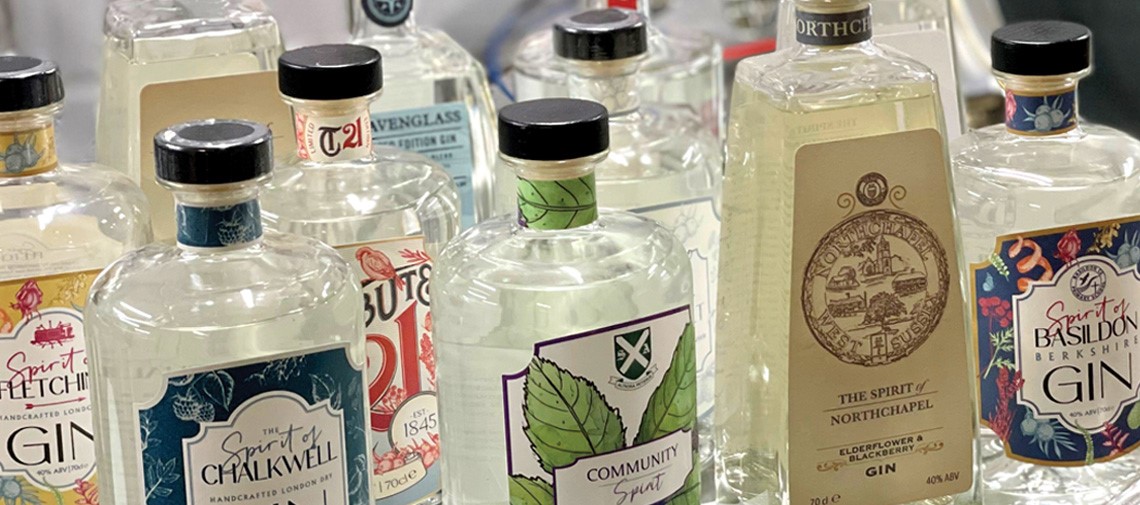Increasing numbers of schools are turning to gin as a novel way to raise funds, discovers Zoë Hill

Forget branded mugs and T-shirts. The latest inspired thinking for school fundraising is to take a classic bestselling product and give it a twist. Many school PTAs and charities have latched on to the growing popularity of gin, and are working with craft distilleries to develop, brand and sell their own varieties with great success.
One such is Northchapel Primary School PTA in West Sussex. PTA member Nina Morgan recalls how her interest was piqued by a Facebook group post asking: ‘Has anyone sold a school gin before?’ She did some research and presented her findings to the PTA, which approved her idea. ‘I messaged the company I got my first quote from and started trying to firm up numbers and what contribution we could make to the gin, bottle and label to make it unique to our village,’ says Nina. ‘But suddenly the price started shooting up, without any way of personalising it. I learnt a valuable lesson – never run with the first and only quote.’
After this initial setback, Nina spoke to several more companies to obtain quotes and find out more about the support they could offer, before settling on the award-winning Hawkridge Distillers in Berkshire. ‘Hawkridge had agreed a great price for the gin,’ says Nina. ‘They were aware that the PTA was a registered charity, and were happy to get involved and help us with a different approach to fundraising. They guided me through the intricate process of flavour combinations.’
Keen to make the PTA’s gin as local and authentic as possible, Nina opted for an elderflower and blackberry flavour, both of which are abundant in the village of Northchapel. She and her children collected these ingredients to use in the finished product, which she called the Spirit of Northchapel.
Nina began by messaging the school and village WhatsApp groups and taking pre-orders, before setting up a Facebook and Instagram page for the gin, where she kept people informed about the distillery process and delivery of the gin, as well as sharing photos from happy customers. ‘Initially I was incredibly nervous’, she recalls. ‘As a small school of 56 children, three of whom were mine, I wondered how many bottles we would actually sell.’
In fact, the gin proved to be in huge demand, with the first 80 sold through pre-orders alone. Nina has now placed her second order with the distillery. ‘From our initial 100 bottles of gin, we have managed to raise an amazing £1,060,’ she says.
St Andrews Nuthurst School Association has seen similar success with its gin, the Spirit of Nuthust (right), after Covid restrictions put a dent in the usual fundraising activities. ‘Gin is having a “moment” and we felt making a gin for our local community would not only be super fun for us, but a great way to connect with the local community during a time when we have been so restricted,’ co-chairs Amy Isted and Laura Heap tell us. ‘We have made in the region of £2,000 for the school which we are thrilled with. We estimate that we sold 50% of our gin to people outside our school community – and that has been the lovely part, meeting former pupils, as well as the parents and grandparents of children who had gone through the school. They all said it was nice to be able to give something back to the school, while getting a lovely gin as part of the deal!’
This approach is something that Hawkridge has been seeing more of lately, says James Gurney, one of the distillery’s three owners and managing partners. ‘The first school contacted us about two years ago, and it snowballed from there – we work with about 30 schools now, up and down the country.’
While some distillers will simply use one of their regular gins and put the school’s label on it, James says Hawkridge is all about creating stronger links to the school. ‘I don’t know of any other distillers who do bespoke, completely unique gins using botanical sources from the schools, or from the local area. We just thought it was a nice touch to have something that bonds the gin to that school, to that area.’ One headteacher even offered up her own produce. ‘One gin that’s very popular at the moment is a citrus gin and one headmistress said she had a lemon tree in her orangery, and sent us some of her lemons,’ added James.
There’s also another key local ingredient. ‘We use honey as it’s a really beautiful smoothing agent and gives the gin an almost caramel sort of aftertaste, which is really lovely,’ he says. ‘We find that at almost every school we’ve worked with, there’s a teacher or one of the parents who keeps bees. It’s another way to bond the gin to the school itself. You can’t get more bespoke than that.’
The approach is paying off. ‘I think virtually every single school we work with is on their second or third order of gin,’ says James. As for the secret of the success of school gins, he is quite clear: ‘We’ve had schools send us feedback from parents who have said: “Finally, you’re trying to sell us something we actually want to buy – you’re not trying to sell us a T-shirt with our daughter’s face on it!”’
Sign up to FundEd to access grants and funding support

